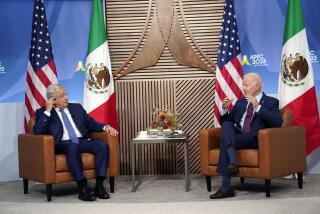Obama, Gitmo and the war on terrorism
Today’s question: Will closing the prison at Guantanamo Bay rehabilitate America’s image abroad, as President-elect Barack Obama argues? Does that even matter if keeping the prison open reduces global terrorism? Glenn M. Sulmasy and David Kaye debate.
A symbolic gesture to rehabilitate America’s image
Point: Glenn M. Sulmasy
David, as we both know, President-elect Barack Obama stated throughout his campaign that he would close the Guantanamo Bay detention facility. In fact, in a “60 Minutes” interview on Sunday, he reiterated his intention by saying, “I have said repeatedly that I intend to close Guantanamo, and I will follow through on that.” Others have expressed similar intentions for the future of this facility over the last couple of years, including President Bush, Secretary of State Condoleezza Rice, Secretary of Defense Robert Gates and Obama’s former rival, Sen. John McCain. As we will discuss later in the week, the most difficult decision now is not whether to close Gitmo, but how to go about closing the facility and what to do with the detainees once it is closed.
For myriad reasons, the controversy surrounding Gitmo has negatively affected the global leadership role of the United States. Perhaps more important, it has hindered our ability to garner the necessary domestic and international support to effectively prosecute the war against Al Qaeda. Eroding public support does matter in the long-term ability of the U.S. and its allies to prevail over Al Qaeda and international terrorism. The legitimacy of the military commissions that try suspected terrorists as well as their location on an overseas territory has become a “lighting rod” of criticism from foreign leaders and nongovernmental organizations, as well as members of Congress.
Well-publicized examples include Sen. Dick Durbin (D-Ill.), on the floor of the U.S. Senate, comparing those serving at Gitmo to Nazi soldiers and members of the Pol Pot regime. Irene Kahn, president of Amnesty International, referred to Gitmo as the “gulag of our time.” Such hyperbole is most unfortunate.
But the indisputable reality remains that in the seven years since the 9/11 attacks, only three detainees at Gitmo have had their cases adjudicated (David Hicks, Salim Ahmed Hamdan and Ali Hamza Bahlul). This paucity of trials has strengthened the impression that the detention facility was created for the sole purpose of implementing a “preventive detention” scheme and that the Bush administration never really had the desire to actually try the detainees held at Gitmo.
The relatively swift judicial resolutions that can be obtained in the military justice system were the initial catalyst for the government to employ military commissions. However, for a variety of reasons (including procedural delays, over-reliance on Ex parte Quirin and a lack of appreciation for the liberalization of military due process since the end of the World War II), the military commissions failed to be implemented in a way to ensure the rapid adjudication of the detainees. As a result, cynicism and criticism of the entire process and its players became widespread. In hindsight, the military commissions were not ideally suited for this hybrid war (the war on Al Qaeda is a true blend of law enforcement and warfare).
Closing Gitmo will unquestionably improve America’s standing in the eyes of the global community. On that, David, I think we can agree. It will be a symbolic gesture that reinforces the perception that the Obama administration intends to conduct foreign affairs in a more internationalist fashion. The closure, however, cannot be done in a vacuum. Other changes, including the creation of a judicial process to effectively adjudicate terrorist detainees, must occur as well. Terrorists are a major threat to global stability in the 21st century. Closing Gitmo is merely the first step.
Thus, David, the new administration is presented with the unique opportunity to guide the U.S. in regaining the initiative and actively promoting human rights and the rule of law. In closing Gitmo, Obama can reestablish the perception that the United States is once again the “shining city on a hill.”
Glenn M. Sulmasy is on the law faculty of the U.S. Coast Guard Academy and an expert in national security law. He is the author of the forthcoming book “The National Security Court System: A Natural Evolution of Justice in an Age of Terror” (Oxford University Press). The views expressed are his own.
One step in rolling back disastrous Bush administration policies
Counterpoint: David Kaye
Glenn, we share a lot of common ground, but I would start by acknowledging the merits -- not just the symbolic value -- of closing the detention facility at Guantanamo Bay, Cuba. There are a substantial number of individuals detained at Gitmo who committed crimes, and they should be prosecuted (I’ll get to the “how” below).
But from the moment Gitmo was established in early 2002, the Bush administration created a process by which we do not know -- or at least cannot be certain of -- the identities and alleged “bad acts” of many of those whom we are detaining. And yet our government has held hundreds of people on uncertain grounds, seeking to keep them beyond the reach of U.S. courts and international legal norms. Take a look at in this report by the UC Berkeley Boalt Hall School of Law’s human rights legal clinic (pdf) for a sense of the disturbing human implications of the Gitmo system of detention. In short, the values underlying our nation and the human rights norms our country helped develop lead to one conclusion: Gitmo must be closed.
Of course, we agree that the closure of Gitmo will help improve America’s standing, and this widely held view will be important in getting bipartisan political support for closing the facility. But I don’t believe that anyone, and certainly not Obama, argues that merely closing Gitmo will rehabilitate America’s credibility abroad. We can point to a long list of policies related to the fight against terrorism that have undermined American credibility abroad (and have become relics of Bush obfuscation, such as “enhanced interrogation techniques,” better known as torture or cruel, inhuman and degrading treatment). Closing Gitmo on its own doesn’t address that long list.
Rolling back Bush administration policies thus involves a package of course corrections, of which closing Gitmo is only one, albeit the most prominent and trickiest to implement. Moreover, as you note, it has to be closed correctly. “Closing Guantanamo” means returning most detainees to their home countries or a third country that will take them, ending the trials by military commissions and transferring detainees where appropriate to federal courts or military courts martial for prosecution. It means a clear rejection, in law and policy, of harsh treatment of detainees (especially torture) and a return of fidelity to the Geneva Convention and other norms of international law.
This can’t all happen overnight, but the president-elect has already restated his intention to close Gitmo, and a bureaucratic, diplomatic and legal process to get this accomplished will undoubtedly be set in motion soon after Inauguration Day.
It’s important also to address a false premise in the second question posed by The Times. I have not seen any evidence to substantiate the claim that Gitmo reduces global terrorism nor that “taking the gloves off” wins us greater security from terrorism. To the contrary, as you suggest, Glenn, the effect of a renewed American credibility and legitimacy should be greater willingness of others around the world to cooperate with U.S. counter-terrorism efforts -- a definite benefit to American security.
David Kaye, a former State Department staff lawyer with responsibility for the law of war, is executive director of the UCLA School of Law’s international human rights program.
More to Read
A cure for the common opinion
Get thought-provoking perspectives with our weekly newsletter.
You may occasionally receive promotional content from the Los Angeles Times.






